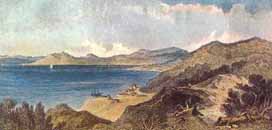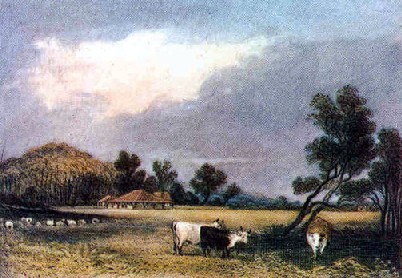 | Twelve months in Wellington / by John Wood (1843)
Chapter 10 |
| Contents: narrative | chapters: 1 | 2 | 3 | 4 | 5 | 6 | 7 | 8 | 9 | 10 | 11 | 12 | 13 | 14 | 15 | 16 | 17 | |
One gentleman, Mr. Marten, has cleared and brought under cultivation about twenty acres of forest ground situated in the mountains about a quarter of a mile behind the town. This in June or July, 1842, had cost him nearly £500. Part of the ground was an old Maori clearing, and yet with this advantage, and that of proximity to a market, his receipts up to that period were only £2. 2s. 9d. He had a large field in cabbage, which he told us it would not pay to send in to town. Mr. Watt farms 100 town acres of fern-covered land. From this he expected, for the first potato crop of 1842, 300 tons. But what was the return? Three tons of picked potatoes instead of 300. The same gentleman, we are told in the Gazette of June,1842, expected to have from some wheat unreaped nine tons of fine flour ; but whether his calculations on the produce of his wheat turned out better than his potato crops, we never heard. We should add that the ground cultivated by Mr. Watt is of the poorest quality, and not a fair sample of New Zealand soil. But here, as elsewhere, we wish these things to be known, for when we are gravely told by the Gazette that the wheat of Mr. Molesworth (what would the Company's agent do without him?) yields at the rate of ninety bushels an acre, and some of his potato fields fifteen tons to the same, it is right the public should be informed that others are not so successful. What this gentleman is to the Port Nicholson folks, Mr. Bell is to the Wanganui people. For what the latter has done we refer to Mr. Nixon's letter under the head of Districts. Agricultural establishments at high money wages will not answer. When capital is to be thus invested, the cotter system of Scotland, where a large portion of the ploughman's salary is paid in kind, should be introduced. But even with this improvement agricultural establishments in the colonies never answer. Cut them up into small holdings, and the land that would not before pay its expenses will then yield a small rent besides a profit to its hard-working tenant.
|

